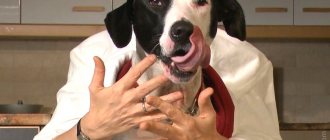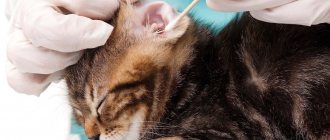In the modern world, the working “function” of dogs fades into the background. If a dog sits on a chain for years and performs exclusively the function of guarding the territory, then not only his psyche suffers, but also his health, and many symptoms of problems simply go unnoticed. One such symptom is bad breath in your dog.
Any loving owner of an animal is constantly in contact with him during the day, and in this situation it is not difficult to notice that the pet’s mouth smells unpleasant. Why this happens, what it may indicate and how to treat it, we will look at it in this article.
Causes of bad breath in adult dogs
First of all, the cause of bad breath can be not only some kind of disorder in the oral cavity, but also a problem in other body systems.
Oral diseases
| Name of the disease | Description | Symptoms | Treatment |
|
|
|
|
|
|
|
|
|
|
|
|
|
|
|
|
|
|
|
|
|
|
|
|
Sometimes “pockets” form in the mouth where pieces of food get trapped. These may be folds on the gums or mucous membranes.
Metabolism problems
| Name of the disease | Description | Symptoms | Treatment |
|
|
|
|
| Diabetes |
|
|
|
Problems with the digestive system
| Name of the disease | Description | Symptoms | Treatment |
|
|
|
|
|
|
|
|
|
|
|
|
When the anal glands are blocked, your dog's breath may smell fishy. Because clogged glands produce bacteria, which the dog licks off due to itching.
Respiratory diseases (damage to the respiratory system)
| Name of the disease | Description | Symptoms | Treatment |
|
|
|
|
|
|
|
|
|
|
|
|
Dermatological pathologies (skin diseases).
| Name of the disease | Description | Symptoms | Treatment |
|
|
|
|
|
|
|
|
|
|
|
|
|
|
|
|
Also, often a dog’s bad breath does not signal an illness, but simply that the dog has eaten something strong-smelling. For example, onions, garlic or fish.
Also, many dogs have a very bad desire to eat carrion that they find on the street, in which case a sharp aroma of rotten meat comes from the dog’s mouth.
Another “headache” for many owners is when their pet has coprophagia, which is the name given to the urge to eat feces. The pet smells appropriately. Since such a habit entails negative consequences in the form of stomach upset, helminth infection, etc., this must be combated.
Other symptoms accompanying mouth odor
A specific aroma may be accompanied by various symptomatic manifestations: weakness, weight loss or gain, changes in the pet’s activity, refusal to eat, severe thirst. Any deviation from usual behavior indicates that prompt consultation with a specialist is required.
What should alert the owner:
- profuse drooling;
- slurping while eating, awkwardness when grabbing food or toys;
- drowsiness and lethargy;
- the active pet stopped being mischievous, but the calm one, on the contrary, became too nervous;
- problems with urination and bowel movements;
- the coat becomes bad, dull, the skin flakes;
- unmotivated aggression appears;
- the pet refuses its favorite treats and adored games.
It is worth observing your pet for a day, maximum two. If one of the above symptoms is associated with halitosis, make an appointment with a veterinarian.
Causes of bad breath in puppies
For puppies, the situation is somewhat different. They have much fewer reasons for bad breath. The most common cause of bad breath in young dogs is changing teeth. Or rather, those cases when this process does not go according to plan.
In puppies of small breeds, the molar may grow behind the milk tooth, or in front of it. Consequently, the baby tooth does not fall out as it should, but begins to rot. Hence the smell. This problem can only be dealt with with the help of a veterinary specialist; he will remove the missing tooth, thoroughly treat the cavity and, if necessary, prescribe antibiotics.
Another reason lies in the location of the teeth. Unlike adult dogs, whose teeth are located quite tightly together, puppies most often have gaps between their teeth. Food particles fall into these gaps, get stuck and the process of rotting begins, which causes bad breath.
Well, in addition, all dogs, and puppies in particular, love to chew on everything. Be it toys, the owner's slipper or sticks. It is the latter that can cause quite severe damage to the baby’s gums. Even through just scratches, an infection can enter, putrefactive microflora and a corresponding smell will develop. In this case, it is also better to contact a veterinarian, as surgical treatment of the wound and a course of antibiotics may be required.
To prevent the above problems, you need to periodically brush your pet’s teeth. It's not difficult and not at all expensive. This procedure will help prevent stuck pieces of food from rotting. And also, during cleaning, you examine the pet’s oral cavity and notice any pathological changes in time.
External factors that provoke a nasty odor
There are other mediators that cause dog mouth stink. Fortunately, they are easy to correct.
What applies to external provocateurs:
- Eating protein treats. When deli meats are metabolized, a nitrogenous product is released, which causes a rotten smell. This phenomenon can be avoided if you reduce the amount of meat and other foods rich in protein in your diet.
- Food settling in the buccal space. Pieces of food stuck behind the cheeks can fester over time and create a rotten smell.
- Change of drink. If you stop giving your pet spring water and switch to chlorinated water, this can cause dysbiosis in the animal. The disease gives rise to the spread of an unpleasant odor.
- Unbalanced pet diet. To keep your pet's breath fresh, you need to switch to natural nutrition and higher quality food.
The above problems are not so serious and can be easily eliminated.
How to properly care for your oral cavity
To ensure that everything is in order with your pet’s teeth, you need to monitor oral hygiene. There are several ways to clean your teeth.
Natural
To clean your dog's teeth naturally, you need to adjust your diet. A dog is a predator, and for dental health, it needs to chew.
- From natural products, it will be useful to give well-boiled cartilage, pork ears, beef bones (namely the head of the hip joint, in simple words - maslaki). You can also give your dog a carrot or an apple to chew on.
- If you feed dry food, then it itself prevents the development of tartar and eliminates the likelihood of food getting stuck in the teeth.
- In today's market, pet store shelves are filled with special “bone” treats, which are designed specifically for cleaning teeth and are completely safe. Plus, pets really like it.
Using a brush and paste
The brush and paste must be specifically designed for dogs; under no circumstances use human tools!
This cleaning should be done 2-3 times a week. It is necessary to accustom your pet from puppyhood and gradually; the dog should not be afraid of such a procedure.
The advantages of this cleaning:
- Clears teeth of stuck food.
- Prevention of tartar formation.
- You examine your pet’s oral cavity and notice pathological changes during the examination.
There is only one minus - it is time-consuming. But it really is a necessity if you want your pet to be healthy.
At the veterinary clinic
In advanced cases, when cleaning the house will no longer help, tartar has appeared, you need to go to the clinic. Teeth cleaning is carried out using ultrasound.
The procedure is painless for the pet and is performed under light anesthesia. If your dog is calm and easily tolerates such manipulations, you can do without anesthesia at all.
Important! The veterinarian must remove stone from not only the front part of the teeth, but also the back and gingival surface.
Acetone
This problem most often occurs with diabetes mellitus . Associated symptoms include severe thirst, changes in body weight, and symptoms such as itchy skin and fatigue may also be present.
Sores may appear on the skin, and the animal itself is most likely lethargic. This disease must be treated throughout life.
You need to consult a good doctor, because... this pathology is very dangerous due to its complications.
Briefly about the main thing
- A dog's breath can smell bad for a variety of reasons. This phenomenon can be either a signal of illness or simply that the dog has eaten something strong-smelling.
- It is necessary to carefully monitor your pet's oral hygiene. And it is entirely your responsibility if you want your pet to be healthy.
- Brushing your dog's teeth is not a whim, but a necessity for health. The main thing is to do it right.
Have we answered your question fully enough? If not, post your question in the comments below and our veterinarian will answer it.
Did you like the article? Share it with your friends on social media. networks. This will help them get useful information and support our project.
Urine
If your dog smells like urine coming from his mouth, he needs to see a veterinarian very urgently . Because, most likely, the smell of ammonia is associated with kidney problems. But there may also be liver problems: one of the most serious consequences is Cushing's syndrome.
How are kidney or liver problems and bad breath related? Slowing down the removal of metabolic products from the body leads to the formation, even increased release of ammonia by tissues.
Read more about this and other problems in the article “Why does a dog smell like dog, fish or rotten meat: we solve problems quickly”











